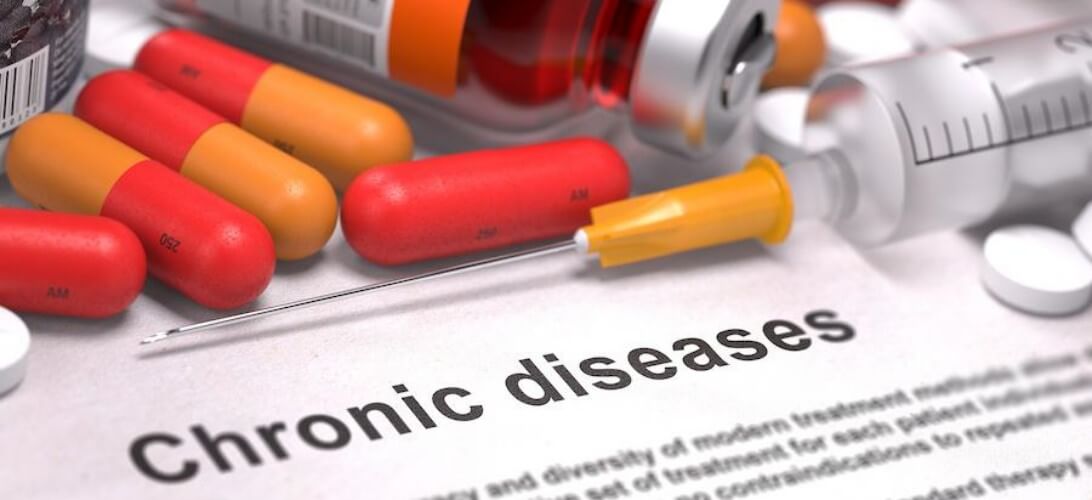Highlights
- Chronic diseases are conditions that last long-term, require ongoing medical attention, and limit a person’s daily activities.
- Chronic diseases are the leading causes of death and disability in the United States.
- Many chronic diseases require lifelong management, including lifestyle changes and medication management.
- BidRx makes it easier to access treatment and save money on your prescriptions.
Chronic diseases, such as heart disease and diabetes, are the leading causes of death and disability in the United States. This is troubling, when an estimated six in 10 American adults are living with at least one chronic disease. Fortunately, chronic disease is manageable.
About Chronic Disease
Most leading health agencies define chronic disease as conditions that last for at least one year, require ongoing medical attention, and/or limit normal daily activities. Chronic diseases may also be referred to as noncommunicable diseases or chronic conditions.
Chronic diseases are primary drivers of death, disability, and economic burden in the United States. An estimated 90 percent of the $4.1 trillion spent on health care each year goes toward managing chronic and mental health conditions.
The chronic conditions accounting for the leading causes of death and disability within the United States are:
- Alzheimer’s Disease
- Cancer
- Chronic Kidney Disease
- Chronic Lung Disease
- Diabetes
- Heart Disease
- Stroke
What Counts as a Chronic Disease?
The definitive list of chronic diseases varies across health agencies and research institutions. Some agencies focus on the key list of diseases that drive death and disability in the United States. Others take a broad approach that includes mental health conditions, HIV, and other conditions.
A task force within the US Department of Health and Human Services created a list of 20 chronic conditions to reference, based on a set criteria list across leading agencies and institutions. There is some variation in how these conditions are monitored and some agencies continue to include a broader list.
This list includes:
- Alzheimer’s disease and related dementia
- Arthritis
- Asthma
- Autism spectrum disorders
- Cancer
- Cardiac arrhythmias
- Chronic kidney disease
- Chronic obstructive pulmonary disease (COPD)
- Congestive heart failure
- Coronary artery disease
- Depression
- Diabetes
- HIV/AIDS
- Hepatitis (Chronic Viral B&C)
- Hyperlipidemia (high cholesterol)
- Hypertension
- Osteoporosis
- Schizophrenia and other psychotic disorders
- Stroke
- Substance use disorder (SUD)
Risk Factors for Chronic Disease
Chronic disease is thought to result from a combination of genetic, physiological, behavioral, and environmental factors. However, researchers have identified several factors that increase your risk for developing chronic disease.
Key risk factors include:
- Excessive alcohol use
- Exposure to secondhand smoke
- Physical inactivity
- Poor nutrition, including diets high in sodium and saturated fats
- Tobacco use
Managing Chronic Disease
Chronic disease often requires lifelong management. Management can include lifestyle change, medication management, and sometimes more intensive treatments, like surgery. The right management for you will depend on the chronic condition(s) you’re living with, the severity of your condition(s), and your overall health status.
Treatment can be time-intensive and costly. This is especially true for people living with multiple conditions. Approximately four in 10 adults are living with two or more chronic conditions. Accessing care early is important to preventing health complications and the development of new conditions.
Arthritis
Close to one in four American adults have been medically diagnosed with arthritis. This accounts for an estimated 58.5 million people, and some researchers suggest this is a low estimate.
Most people living with arthritis have either:
- Osteoarthritis. This chronic disease affects the joints. It deteriorates cartilage and narrows space within the joint. Osteoarthritis can also cause bone spurs, affect joint function, and cause bone overgrowth.
- Rheumatoid arthritis. This chronic disease is an inflammatory disease that affects the joint linings. It can cause inflammation in all joints, but may also affect your organs.
Many people manage arthritis with over-the-counter medication, physical therapy, lifestyle changes, and prescription medication. Some cases of arthritis require surgical treatment.
When OTC treatments aren’t adequate to manage arthritis symptoms, your provider may recommend:
- Biologics
- Corticosteroids
- Disease-modifying antirheumatic drugs (DMARDs)
- Hyaluronic acid therapy
- Prescription nonsteroidal anti-inflammatory drugs NSAIDs)
Asthma

Approximately one in 13 people living in the United States has asthma. This equates to close to 25 million people, including 20 million people over the age of 18. Asthma can severely limit your daily activities if left untreated.
Asthma is an inflammatory lung disease. People with asthma experience asthma attacks, which often include wheezing, coughing, shortness of breath, and chest tightness. During an asthma attack, the muscles surrounding your airways tighten and your air passages begin to swell and narrow.
Asthma is commonly triggered by environmental allergens and physical activity. Some people with asthma experience long periods without noticeable symptoms or asthma attacks. Some people with asthma experience long-term shortness of breath and coughing.
People with asthma should avoid allergens and respiratory irritants. Most people can manage their asthma with the right medications. The right medication can prevent severe asthma attacks and can help maintain normal airway function.
The most common medications for asthma include:
- Long-acting bronchodilators
- Inhaled corticosteroids
- Leukotriene inhibitors
- Mast cell stabilizers
- Interleukin inhibitor
Cancer
Cancer is a leading contributor to disability and the second leading cause of death in the United States. Nearly two million new cancer diagnoses are made each year.
Cancer can be considered a chronic disease, just like heart disease or diabetes. This is because many forms of cancer require ongoing treatment. Some cancers may never go away or they may return after treatment.
Many forms of cancer can be successfully managed with treatment. The cancer may not grow or spread (partial remission), or it may even go away (complete remission). The right treatment for you will be based on your condition, the location of the cancer, the stage of cancer, your overall health status, and your preferences for treatment.
The most common treatments for cancer are surgery and chemotherapy. Other treatments include:
- Hormone therapy
- Immunotherapy
- Radiation therapy
- Targeted therapy
Chronic Kidney Disease
At least one in seven adults in the United States is living with chronic kidney disease (CKD). Approximately 37 million adults have CKD, but an estimated 9 in 10 adults with CKD don’t know they have the disease. Untreated CKD can become severely debilitating and even deadly.
Living with CKD leads to kidney damage, making it harder for your kidneys to filter waste from your body. CKD is linked to high blood pressure, heart disease, and stroke.
Managing CKD requires treating any underlying conditions, such as high cholesterol, high blood pressure, or diabetes. Many people with CKD take prescription medications to lower their blood pressure, lower their cholesterol, and control their blood sugar. Certain blood pressure medications, specifically ACE inhibitors and ARBs, can slow kidney disease, regardless of whether or not you have high blood pressure.
Other medications commonly prescribed for people with CKD include:
- Diuretics
- Finerenone (Kerendia)
- Dapagliflozin (Farxiga)
Chronic Obstructive Pulmonary Disease
Chronic obstructive pulmonary disease (COPD) describes diseases, such as chronic bronchitis and emphysema, that block airflow and cause breathing-related problems. More than 15 million Americans have been diagnosed with COPD, but researchers suggest that many people living with COPD aren’t aware that they have the condition.
The most distinguishing symptom of COPD is breathlessness. Some people also experience a chronic cough, with or without mucus, and extreme tiredness. People with COPD are at a high risk for complications from infectious respiratory illnesses, such as influenza or COVID-19.
COPD is not curable, but it can be managed with treatment. Treatment can help to reduce your risk of complications, increase exercise tolerance, and alleviate symptoms that disrupt your daily life.
People with COPD are advised to avoid smoking and tobacco use, avoid secondhand smoke and air pollutants, avoid lung infections, complete pulmonary rehabilitation, and stay on top of their medication regimen. Some people with COPD use supplemental oxygen to maintain their blood oxygen levels. There are many different medications used to treat COPD.
Common medications used to treat COPD include:
- Anti-inflammatory medications
- Bronchodilators
- Combination medications
- Corticosteroids
Heart Disease and Stroke

Heart disease and stroke are the first and fifth leading causes of death in the United States, respectively. Heart disease encompasses a variety of conditions affecting the heart, with the most common condition being coronary artery disease. Strokes are considered a cardiovascular emergency.
Some people confuse the terms heart disease and cardiovascular disease. Cardiovascular disease is an umbrella term that encompasses many conditions affecting the heart and blood vessels, including heart disease and stroke. Cardiovascular disease affects nearly half of the adult population in the United States.
Coronary artery disease can be managed with lifestyle changes and medication. The most commonly prescribed medications for coronary artery disease include:
- Antiplatelet agents
- Angiotensin-converting enzyme (ACE) inhibitors
- Angiotensin II receptor blockers (ARBs)
- Beta blockers
- Calcium channel blockers
- Isosorbide dinitrate or nitroglycerin
- Ranolazine
- Statins
Stroke can be considered a chronic disease that has acute events. These events are sometimes called a brain attack. They occur when the blood supply is blocked to the brain or when a blood vessel bursts in the brain.
The most common medications prescribed to manage stroke include:
- Anticoagulants
- Antiplatelets
- Blood pressure medications
- Statins
Diabetes (Type 2)
Approximately one in 10 Americans has diabetes. This equates to more than 37 million people, and more than 90 percent of them have type 2 diabetes. There isn’t a cure for diabetes, but it can be managed with lifestyle changes and medication.
With type 2 diabetes, your body doesn’t respond normally to insulin. This means your body can’t maintain normal blood sugar levels. These issues can cause serious health problems, such as heart disease, kidney disease, or vision loss.
Making healthy lifestyle changes, such as eating a balanced diet and engaging in regular physical activity, can make it easier for you to manage diabetes. The best treatment to manage your diabetes will depend on the severity of your condition and your overall health status.
There are a variety of injectable and oral medications used to treat diabetes. Some of the most common medications prescribed include:
- DPP-4 inhibitors
- GLP-1 receptor agonists
- Insulin
- Meglitinides
- Metformin
- Sulfonylureas
- Thiazolidinediones
- SGLT2 inhibitors
High Blood Pressure
Close to half of American adults have hypertension. Hypertension, also called high blood pressure, is defined as any systolic blood pressure higher than 130 mmHg or diastolic blood pressure higher than 80 mmHg.
High blood pressure damages the lining of the arteries. This damage puts you at greater risk for heart disease and stroke. Hypertension was listed as a primary or contributing cause of more than 670,000 deaths in 2020.
Unfortunately, only about one in four adults with hypertension has the condition under control. Treatment for high blood pressure usually involves lifestyle changes, ongoing monitoring, and prescription medication. The best treatment for you will depend on how high your blood pressure is and your overall health status.
Medications commonly prescribed for high blood pressure include:
- ACE inhibitors
- Alpha-blockers
- Angiotensin-receptor blockers
- Beta-blockers
- Calcium channel blockers
- Diuretics
High Cholesterol
Close to 94 million American adults over the age of twenty have high cholesterol. High cholesterol is defined as having total cholesterol levels above 200 mg/dL. This condition is also referred to as hyperlipidemia.
People with high cholesterol can develop fatty deposits in their blood vessels. Over time, these deposits can make it difficult for blood to flow through your arteries. These deposits can also lead to blood clots, which can cause heart attack or stroke.
The first step in managing high cholesterol is making healthy lifestyle changes. If lifestyle changes don’t lower your cholesterol levels enough, your provider may prescribe medication to help manage your condition.
Major classes of prescription medications for high cholesterol include:
- Statins
- Cholesterol absorption inhibitor
- PCSK9 inhibitors
- ACL inhibitors
- Bile acid sequestrants
- Fibrates
Major Depression

Major depression is one of the most common chronic mental health conditions for Americans. In 2020, approximately 21 million adults experienced at least one depressive episode. Major depression can be severely debilitating, making it difficult for you to engage in your normal daily activities.
Depressive episodes are characterized by a depressed mood, loss of interest or pleasure in activities, and problems with sleeping, eating, concentration, and sense of self-worth. These episodes last a period of two weeks or longer.
Most people with major depression benefit from a combined treatment approach of psychotherapy and medication. It can take time to find the medication that works best for your condition.
The most popular type of prescription medication used to treat medication is selective serotonin reuptake inhibitors (SSRIs). If these aren’t effective, your provider may prescribe alternative antidepressants, such as tricyclic antidepressants or monoamine oxidase inhibitors.
Find the Best Prices for Your Medications with BidRx
Regardless of your condition, we can help you to get the best price for your medications. BidRx invites pharmacies from across the country to compete for your prescription.
Simply sign up for BidRx, create a bid for your prescription, and sit back while pharmacies across the United States place their bids. You can compare prices and choose between having your prescription delivered to your door or picking it up locally.
Let us connect you with local drug stores as well as online, mail-order, and specialty pharmacies. Create your bid and start saving now!
